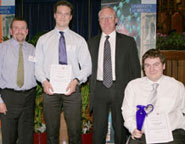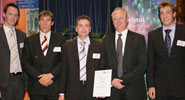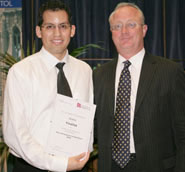At the University’s annual Enterprise dinner in July, SensaGest won the top prize of £15,000, beating off tough competition from nine other finalists.
Spinal cord injury affects approximately 40,000 people in the UK. A diagnosis can be devastating – the sudden presence of disability can be frightening, frustrating and confusing to those affected.
The rehabilitation period for a tetraplegic (paralysis from the neck downwards) is typically six to 12 months, and currently patients alert a nurse that they require assistance by pressing a button on a small-wired device kept on a bed. However, this relies on the patient having sufficient motor function to be able to depress the button.
SensaGest Ltd (Ian Anderson and Paul Duff, postgraduates, Computer Science) is developing a state-of-the-art nurse call system that can be operated by people with minimal hand movement and will be connected to a small wearable computer that will relay alert to a paging device carried by a nurse or care worker. The device will be able to detect changes in conditions, for example a wet bed, and relay this information to a care worker. It also has the ability to be used as a pre-programmed coding system that will allow easier communication and the ability to control devices situated around the bedside.
Second prize was awarded to a team of University of Bristol undergraduates (Tim Deans, Martin Herbert, Ben Jackson and Robbie McLeod), who received £8,000 for StrainTrain – a new product that is set to change the way in which rowers train at all levels from novice to Olympic standard. The electronic device can be attached to an object, for example a rowing boat, and continuously monitors an individual’s or crew’s performance. Developed in the Department of Mechanical Engineering, the product takes direct on-the-oar measurements using strain gauges and allows an unobtrusive yet highly sensitive method of measuring the forces exerted on the oar. The force applied is instantly measured and displayed in real-time direct to the oarsman and allows detailed analysis of technique by both the oarsman and coach.
Third prize was won by Meebots, a concept based on innovative technology for facial express recognition. The technology allows chat applications and multiplayer game users the ability to customise characters to display user facial expressions through electronic face mapping.
W D-Fence Flood Defence, a flood defence system that enables water from rivers or flooded streets to be pumped into an empty water tank, came fourth. The tanks can be moved to act as barriers to prevent floodwater from reaching residential areas and roads.
This year’s competition entries were judged by a panel of experts from the sponsoring organisations including Bristol City Council, Business West, Deloitte, Fortis Bank, STMicroelectronics, Osbourne Clarke and Sulis Innovation. All winners and finalists received support from the judges and sponsors, and received a share of the £30,000 prize fund including cash, free professional advice and managed office space to help make their business a commercial success.
Dr. Neil Bradshaw, Director of Enterprise at the University of Bristol, commented: ‘Our annual New Enterprise Competition is designed to inspire new high growth business ideas and entrepreneurial talent. The quality of this year’s entries has been outstanding and we are delighted to have so many staff, students and alumni entering. We are grateful to all of our sponsors for their continued support.’
Guests attending the prestigious award dinner, sponsored by intellectual property company the IP Group, saw each finalist present their entry as well as having the opportunity to network with key players in the local enterprise community.
The Vice-Chancellor, Professor Eric Thomas, said: ‘Our annual Enterprise dinner showcases the full range of the University’s enterprise activities, from entrepreneurship training and support to technology transfer and new company acceleration. I am proud to be able to share our success with our partners from the wider business community.’


